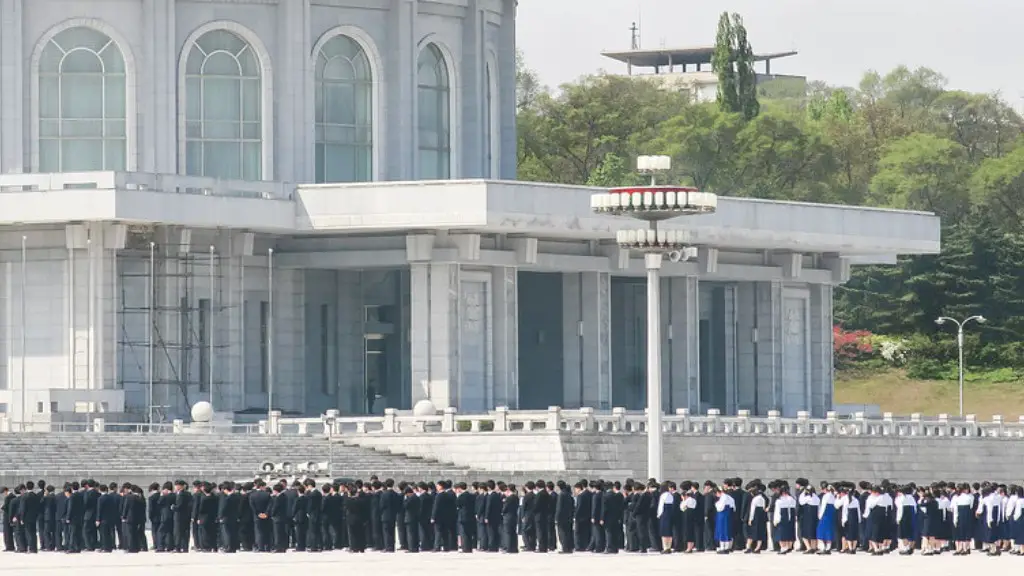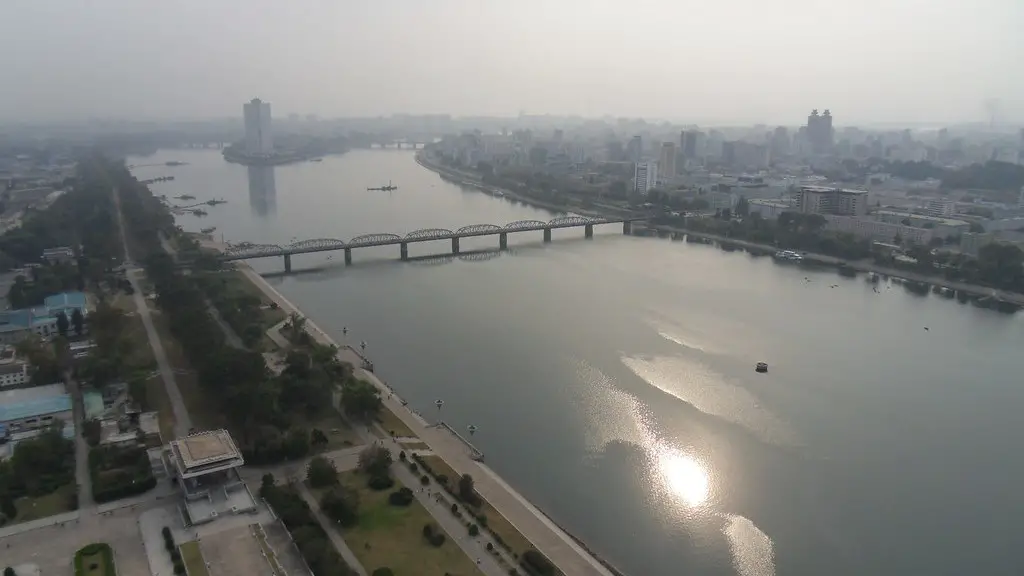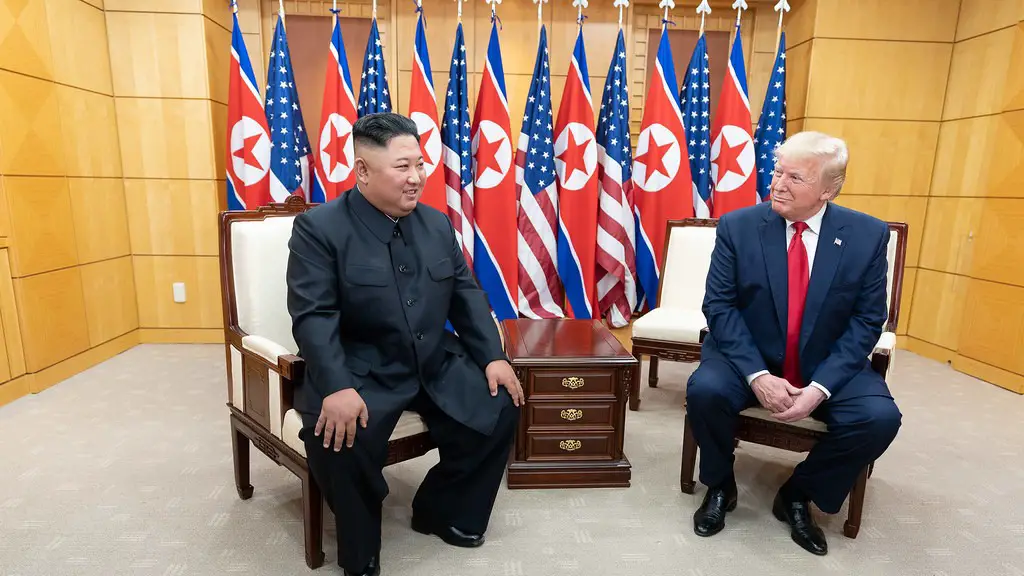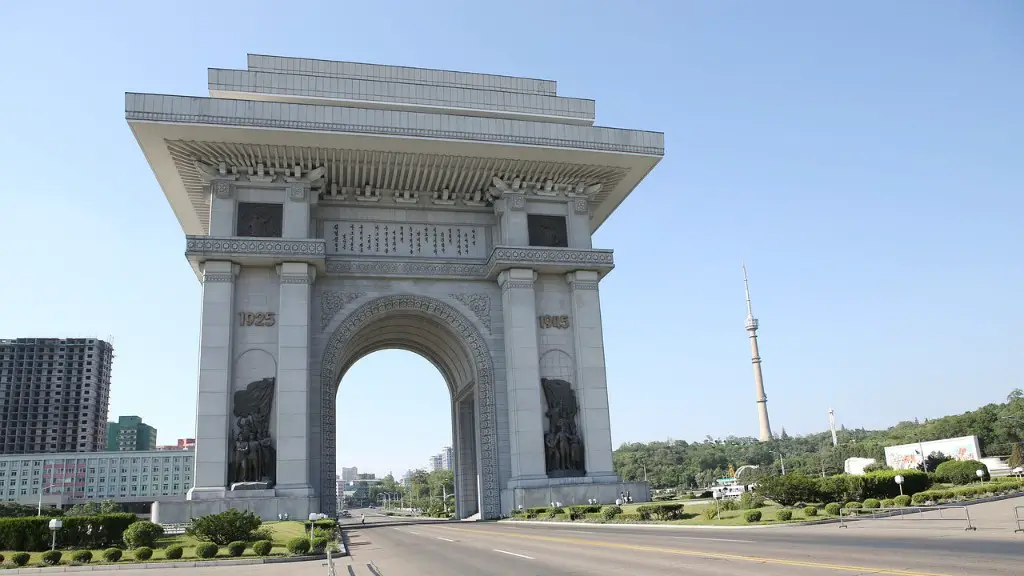Economic Struggles
North Korea is one of the poorest countries in the world. With an average income of $2,000 or less per year, many North Koreans don’t have the money to meet their basic needs. The economy has also been hampered by long-term sanctions from the international community and restrictions on foreign trade. Even in its largest cities, infrastructure and basic amenities are lacking, leaving many without access to clean drinking water and electricity.
Furthermore, the North Korean government maintains strict control over economic activity. Private enterprise is outlawed and foreign investment heavily restricted. The government also has a heavy hand in determining what goods are available to the public and at what price. For example, the market value of the North Korean won has plummeted in recent years, yet the government has kept the official exchange rate fixed.
According to Dr. Yuna Lee, a professor of Asian Studies at the University of Tokyo, this pose a “triple challenge” to North Korea’s economy. “With no access to reliable foreign currency, the country faces chronic shortages and skyrocketing inflation,” says Lee. “And because the government does not allow private enterprise, there’s no way for the population to make up this deficit.”
This has led to increasing poverty and food insecurity in the North, especially in rural areas. While North Korea’s exact rate of poverty is unknown, reports from the United Nations and other sources suggest that at least one-third of the population is living in extreme poverty.
Human Rights Abuses
North Korea’s government has a history of violating human rights and has been accused of some of the worst atrocities in the world. According to a recent report by Amnesty International, North Korea routinely uses torture, arbitrary detention and public executions, and does not allow basic political and religious freedoms.
Reports have also suggested that the North Korean government has set up a system of prison camps, where thousands of political prisoners are held in inhuman conditions. Inmates are subjected to forced labor and denied proper nutrition and medical care. Money is taken from prisoners to finance the government, and prisoners are often publicly tortured and executed.
David Hawk, an expert on human rights in North Korea, says these abuses should not be taken lightly. “North Korea has turned human rights abuses into a governing system,” says Hawk. “It’s a regime that has been systematically violating human rights for decades, with no signs of improvement.”
Furthermore, Hawk states, the international community has not done enough to address these abuses. “The world has been silently complicit in allowing North Korea to continue these abuses,” Hawk says. “It’s time for the world to take this issue seriously and finally take action.”
Subversion of International Law
North Korea is also one of the few countries in the world that has yet to sign the Nuclear Non-Proliferation Treaty. This has enabled them to develop and maintain an arsenal of nuclear weapons, despite strong international opposition. Furthermore, North Korea has consistently ignored United Nations sanctions and defied global pressure to cease weapons testing.
Robert Wood, a former United States ambassador to the United Nations, states that North Korea must be held accountable for its actions. “North Korea is actively undermining international law and the global non-proliferation regime,” says Wood. “It’s time for the international community to come together and put an end to these violations.”
Wood also highlights the need for countries to strengthen their ties and develop a unified front against North Korea. “It’s vital that nations collaborate and coordinate their sanctions and other actions,” Wood says. “Otherwise, North Korea will continue to flout international law with impunity.”
Destabilization of Relationships with Neighbors
In recent years, North Korea has increasingly been at odds with its neighboring countries. The situation between North and South Korea has especially stagnated, with both countries at an impasse over boundary disputes and the deployment of military forces. North Korea has also frequently accused Japan of territorial violations, in addition to its threats against China.
John Delury, director of the Yonsei Institute of North Korean Studies in Seoul, states that North Korea’s behavior is a major cause of these tensions. “North Korea has been deliberately provoking its neighbors with aggressive missile tests and military drills,” says Delury. “This kind of high-stakes brinkmanship is not helpful to anyone.”
Delury also warns that North Korea’s unstable foreign policy could lead to further conflict and instability. “The international community needs to take steps to deter North Korea’s aggression and prevent a larger regional conflict,” Delury says. “It’s vital that we find a solution that allows for peaceful coexistence.”
Colonization of North Korea
North Korea’s situation has been exacerbated by the country’s long history of colonization. Though North Korea was first unified in 1948, the country has endured many invasions and occupations by foreign powers since its founding in the 7th century. As a result, North Korea has struggled to achieve economic and political self-sufficiency.
Dr. John Chu, a professor of Asian History at the University of Tokyo, says colonization has also left its mark on North Korea’s culture. “Nearly a millennium of foreign domination has had a devastating effect on North Korean culture,” Chu says. “This trauma is still evident today, in the form of the government’s mistrust of the international community, and its reluctance to embrace foreign ideas and progress.”
Chu also states that this mistrust has fueled North Korea’s belligerent foreign policy and its pursuit of nuclear weapons. “North Korea is actively trying to protect itself from perceived external threats,” Chu says. “But this is only deepening tensions in the region and isolating North Korea further.”
Oppression of North Korean People
North Korea is well known for its oppressive government and political system. Political dissidents are often jailed and subject to torture and other forms of abuse. Moreover, North Korea’s state-run media actively works to control the public narrative, propagandizing the people and promoting the government’s agenda.
Heather Hurlburt, Director of the New Models of Policy Change Initiative at the New America Foundation, states that North Korea’s media policy puts the truth at risk. “North Korea has been manipulating and fabricating information for years,” Hurlburt says. “The government has also been suppressing its citizens’ access to international media and preventing them from getting accurate information about the world.”
Hurlburt also argues that North Korea’s control over its citizens’ lives is an infringement on their basic human rights. “North Koreans have a right to freedom of information and the right to access the global conversation,” Hurlburt says. “It’s appalling that their government is denying them that right.”
Criminal Activity of the Government
North Korea’s government has also been accused of participating in massive criminal activity, including drug and weapons smuggling, counterfeiting, money laundering and cyber warfare. According to reports, the government has generated billions of dollars through these activities, which it then uses to fund its nuclear program.
Randy Schoenberg, a U.S. lawyer and expert on North Korea, argues that the international community must take action to stop these crimes. Schoenberg states, “North Korea is conducting criminal activities on a global scale and the world must come together to hold them accountable. We can’t ignore this illegal activity and must take steps to stop it.”
Schoenberg also highlights the need for stronger international sanctions, which would put more pressure on North Korea to comply with the law. “Sanctions are the best way to send a message to North Korea that their criminal activities will not be tolerated,” Schoenberg says. “We must take action now to ensure that these crimes are punished.”





